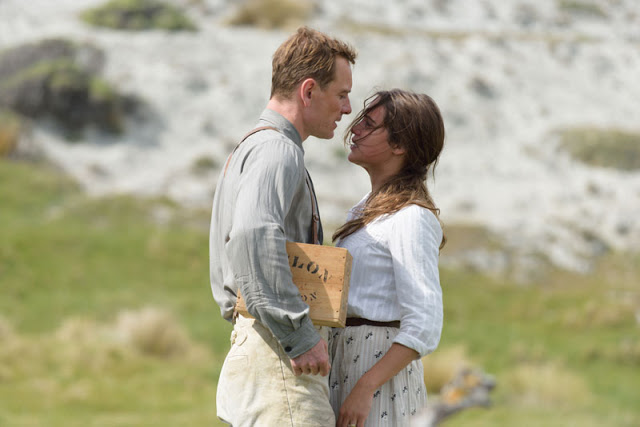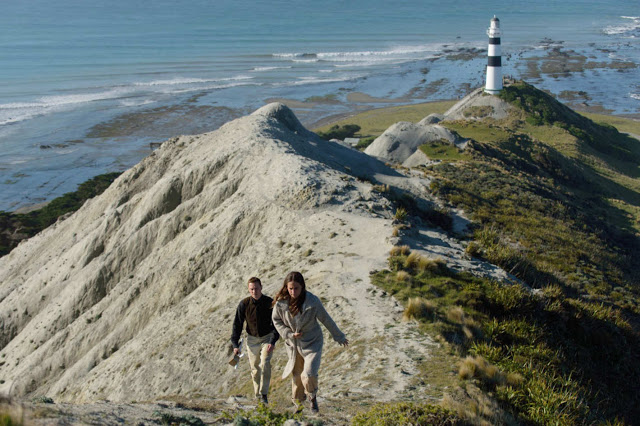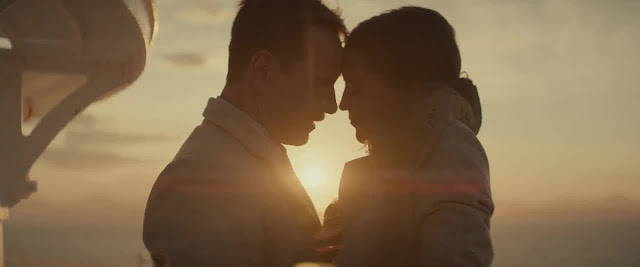Derek Cianfrance isn’t subtle. His movies traffic in heavy sentiment and obvious themes, and they are systematically designed to induce trauma and heartache. If he were less talented, this would feel like manipulative hackwork, but thankfully, he’s as skilled as he is blunt. In Blue Valentine, he performed a brutal autopsy of a marriage while it was still alive, in the process coaxing superlative performances from Michelle Williams and Ryan Gosling. He followed that with The Place Beyond the Pines, a striking, generational crime saga of failed fathers and sons. His new film, The Light Between Oceans, maintains his twin fixations on matrimony and family, striving to wring sweat from your brow and tears from your eyes.
It does not quite succeed. The movie is too deliberate, too mannered, to incite the response it so plainly seeks to provoke. But there is still much to admire in The Light Between Oceans, beginning with its superlative craftsmanship. This is a gorgeous film, with magnificent cinematography from Adam Arkapaw, the talented lenser who gave us the unforgettable tracking shot in True Detective, as well as the ethereal beauty of Jane Campion’s Top of the Lake. Here, capitalizing on Cianfrance’s preference for shooting on location, he delivers frame after frame of stunning naturalism: gentle sunrises peeking over a hillside, waves crashing onto rocky shoals, ships slicing through the mist like wooden blades. These images are accompanied by the tinkling piano and whispering woodwinds that could only be orchestrated by the great Alexandre Desplat. It’s all rather lovely.
This could be a sign of tedium as well as craft. The level of aural and pictorial grandeur found in The Light Between Oceans is liable to brand it a prestige picture, the type of handsome period piece that courts awards-season voters with indecent salesmanship but that lacks true artistic vision. Yet while it features a trio of Academy-fêted actors, the film’s narrative is more modest in scope than your typical Oscar bait. Taking place between the wars, its opening finds Tom Sherbourne (Michael Fassbender), a soldier haunted by the horrors of the front, agreeing to serve as a lighthouse keeper at Janus, a tiny island off the coast of Australia. It’s a lonely job, but that’s fine with the taciturn Tom, at least until he meets Isabel (Alicia Vikander, atoning for Jason Bourne), the plucky daughter of a local merchant. The inevitable happens, and quickly—perhaps too quickly. The Light Between Oceans postures itself as a grand romance, but the union between Isabel and Tom feels constructed rather than organic, diminishing the movie’s stakes even as it gradually revs up its melodramatic engine.
By which I mean… well, I probably shouldn’t say; given that only one thing of consequence happens in The Light Between Oceans, revealing its hook would be unseemly. (The studio evidently felt otherwise—the trailer is appallingly forthcoming with information.) Suffice it to say that the film hinges on an event that takes place shortly before its midpoint, an incident that catalyzes its subsequent emotional turbulence. From there, The Light Between Oceans attempts to methodically tally the devastating costs of this fateful moment, which ripples through the years and affects not only Tom and Isabel but the entire seaside community, leading to simmering feelings of resentment, jealousy, and guilt.
Dramatizing this butterfly effect is harder than it sounds, or at least Cianfrance makes it seem that way. His screenplay, which is based on a novel by M.L. Stedman, is his first based on previously existing material. It shows. Overcompensating for the languor of its opening act, the movie’s final third is muddled and confused, either lurching forward in time or coming to a stultifying standstill. The same is true on a micro level; some scenes end too quickly, while others play on for too long. Throughout, you can perceive Cianfrance’s panic, as though he was unsure of how to condense the novel, so he frantically picked random passages here and there but neglected to thread them together. It makes sense that Cianfrance was attracted to this material—as with Blue Valentine, it contemplates a marriage in crisis, and as with The Place Beyond the Pines, it touches on the immutable bond between parent and child—but he struggles to match his broader ideas to this specific story.
That sense of disconnect is what ultimately submarines The Light Between Oceans, which is otherwise pleasurable viewing for fans of solemn, visually ravishing drama. The movie is exquisitely made, expertly acted, and, in the end, not especially interesting. It has the feel of an academic study of emotion, which precludes it from being truly emotional. The exception to this intellectual remove is Vikander’s fierce, persuasive performance. Following up her breakout 2015—which included an Oscar win for The Danish Girl and a wily turn in Ex Machina—she shows again here a preternatural gift to articulate deep swells of feeling without resorting to weepy histrionics. When Cianfrance simply trains his camera on her, The Light Between Oceans achieves the primal power that it clearly strains for but otherwise fails to generate.
Indeed, Vikander’s performance makes one sympathize with Rachel Weisz, who finds herself hamstrung by the confines of her one-note role as Hannah, a bereaved mother. Yet it is Hannah who best encapsulates The Light Between Oceans. Delicate, decorous, and helpless, she is the perfect symbol for this earnest, well-meaning film, a movie about a lighthouse that, for all its beauty, seems lost in a fog.
Jeremy Beck is the editor-in-chief of MovieManifesto. He watches more movies and television than he probably should.



